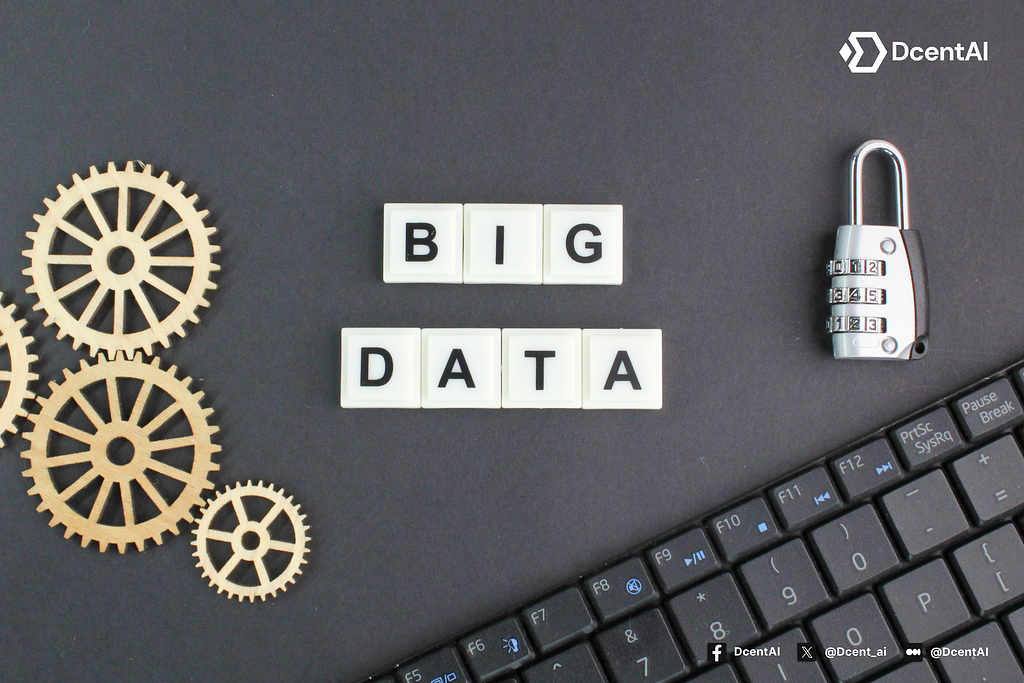Managing Big Data with Decentralized AI: Efficient and Scalable Solutions

The exponential development of data in today’s digital world has revolutionized sectors and fueled innovation, well-informed decision-making, and marketable success. Handling this enormous data for traditional infrastructures presents several challenges, like scalability issues, processing inefficiencies, storage restrictions, and security faults.
Decentralized AI represents a transformative solution that overcomes existing challenges through its distributed data operation strategy.By leveraging technologies such as edge computing, blockchain, and federated learning, decentralized AI empowers the effective, secure, and scalable management of vast datasets. This article highlights DcentAI’s pioneering role in these progressive developments while examining how decentralized AI handles the challenges of huge data management.
Become a pioneer of DcentAI community!Overview of Decentralized AI in Big Data ManagementTo effectively handle large data, decentralized AI uses edge computing, blockchain for data integrity, distributed data storage, and federated learning. Decentralized AI distributes data and processing among several nodes, unlike centralized systems, which gather and analyze data in a single area. This approach uses blockchain for secure and transparent data trade, ensures data sovereignty, and permits collaborative AI model training without concentrating data. By bringing processing near to data sources, edge computing lowers latency and improves responsiveness in real- time.
Advantages Of Decentralized to Centralized Systems- Reducing Single Points of Failure: By removing the need for centralized servers, decentralized AI increases a system’s resistance to malfunctions, outages, and cyberattacks.
- Enhanced Data Privacy and Control: Decentralized AI reduces the threats of centralized data breaches by storing data near its source, permitting businesses to protect control over their data.
- Scalability Through Distributed Networks: Decentralized systems can dynamically scale as data volumes grow, with additional nodes enhancing computational capacity and storage without overburdening a central hub.
Decentralized AI offers innovative tools to tackle the complexities of big data management. These solutions ensure efficient data processing while maintaining privacy, security, and scalability.
Federated LearningFederated learning revolutionizes data management by allowing collaborative AI model training across multiple entities without moving or centralizing the data. Organizations can pool their computational resources and insights while preserving data privacy. For instance, hospitals can develop a shared diagnostic AI model without exposing sensitive patient data. Federated learning is pivotal in enabling diverse, distributed datasets and unlocking powerful insights that remain secure.
Blockchain IntegrationBlockchain technology is critical to secure and transparent data sharing in decentralized AI. It lowers the possibility of tampering and unwanted access by offering an unchangeable ledger that records data exchanges between parties. Additionally, blockchain makes smart contracts possible, automating procedures and promoting confidence between data-sharing entities. In industries like finance, this ensures secure collaboration on fraud detection without compromising sensitive information.
Edge ComputingEdge computing improves real-time data handling by moving computation closer to where data is generated. Lowering reliance on centralized servers guarantees faster decision-making and decreases latency. It is particularly valuable in scenarios like autonomous vehicles, where split-second responses are crucial. By distributing the processing load, edge computing enhances scalability and resilience in decentralized systems.
Distributed Storage SystemsDecentralized storage frameworks distribute data among a network of nodes to effectively manage large data volumes. By duplicating data across several locations, these frameworks, in contrast to conventional centralized storage, ensure redundancy and guard against data loss. This strategy supports scalability, as more nodes may be included in the network without issues. Distributed storage is essential for real-time tracking and secure data exchange between supply chain and logistics partners.
Benefits of Decentralized AI in Big Data Management
Decentralized AI overcomes the drawbacks of conventional centralized frameworks and provides revolutionary advantages for handling enormous sums of data. These benefits — which include improved scalability, efficiency, privacy, and resilience — make it a pivotal procedure for today’s data-driven businesses.
ScalabilityDecentralized AI relies heavily on scalability, making it easy to handle ever-increasing data quantities. More nodes may be easily added to distributed systems, allowing more data generation without overloading the framework. It ensures organizations adapt to future finance, healthcare, or retail demands. Decentralized solutions also balance workloads dynamically, making them ideal for big data applications requiring constant scaling.
EfficiencyDecentralized AI optimizes data processing through distributed computation, where tasks are handled across multiple nodes instead of relying on a single central server. This parallel approach reduces processing times and prevents bottlenecks. Industries like supply chain management benefit from faster insights and real-time decision-making powered by distributed networks, leading to streamlined operations and cost savings.
Enhanced PrivacyDecentralized AI keeps data locally, reducing the risks of central data storage, including breaches and unwanted access. Integrating blockchain technology with federated learning adds more security layers, empowering companies to get insights without revealing individual data. It is particularly vital in sectors like banking and healthcare, where data protection is significant.
ResilienceDecentralized AI enhances system reliability by removing single points of failure. Data and processing tasks are distributed across the network, ensuring that failures in one node do not disrupt the entire system. This fault-tolerant architecture is vital for critical applications like energy grid management or autonomous systems, where uninterrupted operations are essential.
Use Cases Across IndustriesDecentralized AI offers secure, effective, and creative solutions that revolutionize how companies handle and utilize massive data. By resolving significant data handling issues, these use cases illustrate the practical impacts of decentralized AI across several industries.
HealthcareDecentralized AI can safely handle private patient data through localized storage and federated learning. Without exchanging raw data, hospitals may work together to create AI-powered diagnostics tools that will empower faster and more precise disease discovery. For example, decentralized real-time diagnostics can streamline emergency responses and enable personalized treatment plans.
FinanceIn finance, decentralized AI powers fraud detection and risk analysis using distributed data analytics. This approach enhances security, enabling institutions to detect transaction anomalies without exposing customer data. Decentralized systems also provide real-time risk assessments, ensuring regulation compliance and reducing financial losses.
Retail and E-commerceCollaborative AI models in decentralized networks improve personalized recommendations for shoppers. By analyzing consumer behavior across distributed data sources, retailers can tailor product suggestions while safeguarding customer privacy in the retail industry. Decentralized AI optimizes inventory management and supply chain logistics to meet demand effectively.
Energy and UtilitiesDecentralized AI optimizes grid management through real-time data processing across distributed nodes. This procedure integrates renewable energy sources, prevents interruptions, and balances the supply and demand for energy. Additionally, decentralized frameworks improve energy distribution transparency, which fosters sustainability and effectiveness.
Challenges in Managing Big Data with Decentralized AI
Decentralized AI presents promising big data management solutions but has critical limitations that should be carefully considered. Below are the difficulties and how DcentAI can help:
Coordination and SynchronizationManaging data across distributed nodes requires ensuring consistency, which can complicate differences in processing times or delays in communication between nodes. Lack of data synchronization may lead to discrepancies in model training and decision-making processes. DcentAI employs advanced synchronization protocols to maintain real-time consistency across nodes. Its robust coordination framework ensures seamless updates and integration, reducing errors in distributed systems.
Infrastructure DemandsDecentralized AI relies on high-performance networks and computational resources to process and store large volumes of data. Organizations without sufficient infrastructure may face latency and scalability issues. DcentAI offers a decentralized network of GPU power and storage distributed globally, enabling organizations to leverage a scalable infrastructure without significant upfront investments. This approach ensures high performance and reliability, even for data-intensive operations.
Regulatory ComplianceHandling big data across decentralized systems often requires navigating complex regional and international data privacy laws. Errors can result in financial penalties and legal issues. By incorporating privacy-preserving technologies like blockchain-based audit trails and differential privacy, DcentAI guarantees regulatory compliance. These solutions support decentralized operations while assisting enterprises comply with data protection regulations.
Data Quality and StandardizationDecentralized AI systems must handle diverse data formats from multiple sources, which can lead to inconsistencies and inefficiencies. Poor data quality affects model accuracy and decision-making. DcentAI facilitates standardized data processing using AI-driven tools to clean and harmonize datasets across nodes. Its ecosystem includes pre-built templates and APIs that enhance compatibility, ensuring high data quality and format consistency.
Role of DcentAI in Big Data ManagementDcentAI is pivotal in transforming big data management through its decentralized ecosystem, which provides scalable, secure, and efficient data storage, processing, and analysis solutions. By leveraging technologies like federated learning, blockchain, and edge computing, DcentAI enables organizations to handle large volumes of data while maintaining data privacy and reducing dependency on centralized infrastructures.
The network can foster partnerships with healthcare, finance, and energy industry leaders, implementing real-world solutions that enhance operational efficiency and data security. DcentAI will continue to drive decentralized AI’s role in big data by expanding its network, enhancing data interoperability, and promoting innovation to address emerging data management and analytics challenges.
In ConclusionDecentralized AI offers scalable, effective, and secure solutions that handle the complexities of conventional centralized frameworks. It presents a revolutionary approach to expansive data management. Decentralized AI uses edge computing, blockchain, and federated learning to provide better data security, faster processing, and increased robustness.
By offering a solid platform that facilitates decentralized data storage and analysis, DcentAI illustrates these developments and promotes industry collaboration while protecting control over delicate data.DcentAI is helping businesses overcome the challenges of processing, storage, and regulatory compliance while empowering them to fully utilize big data through its creative solutions and strategic alliances.
Become a pioneer of DcentAI community!To learn more about DcentAI, visit our Facebook and X accounts.Managing Big Data with Decentralized AI: Efficient and Scalable Solutions was originally published in Coinmonks on Medium, where people are continuing the conversation by highlighting and responding to this story.
